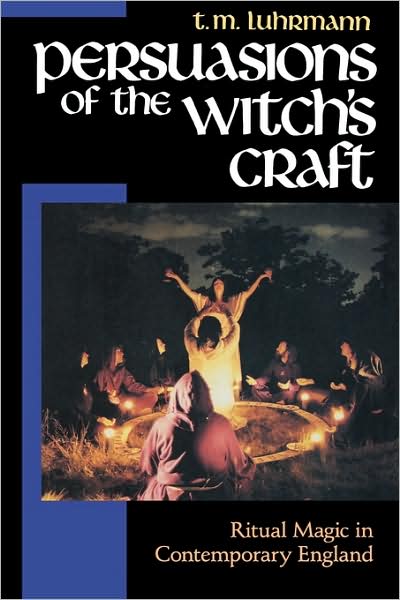Persuasions of the Witch’s Craft November 23, 2015
Author: Beach Combing | in : Contemporary , trackback***Thanks to Stephen D for bringing this book to my attention***
Most anthropologists choose an exotic destination and then head off to live with the Kwang or the Baiga for a couple of years, subsequently using the material they gather there for their doctorates. In the 1980s Tanya Marie Luhrmann, instead, headed from Cambridge in East Anglia down to deepest equatorial London and got involved with the various pagan currents in the capital. She joined dream workshops, a coven and a ritual group connected with the western mysteries and generally had fun: dancing nude in witch circles and taking part in rituals. She never became, though, a believer, she was intent on keeping some critical distance, and her description of a couple of years searching for the grail makes for a fascinating description of British religious counter-culture.
The book recording her experiences is entitled Persuasions of the Witch’s Craft: Ritual Magic in Contemporary England (HUP, 1989). It is a very much the work of a social anthropologist and Durkheim, Fraser, Weber and others regularly appear in the pages: there are also long theoretical passages, which are sometimes half baked (‘doughy’?) for the simple reason that the author is so clearly trying to think out her novel position. But for Beach the best parts of the book were the anecdotes from the capital’s New Age population in the mid late 1980s. A number of quotations will give a better idea than any number of reflections.
‘My appearance precipitated an argument, because one of the women who had given me a lift thought that she had been promised the role of the moon priestess when the previous priestess disappeared.’
‘Alas, [the new coven member] was well-meaning but young and slightly arrogant, and he announced that it was his personal responsibility to redeem the German nation from the atrocities they had committed in the war, an ethical responsibility unappreciated by the strong-minded German translator.’
‘There are no orgies, little eroticism [details Tanya!], and in fact little behavior that would be different if clothes were being worn.’
‘Someone lit a fire in a dustbin lid (the cauldron was too heavy to carry from London)’.
‘I have nothing against homosexuals [said one practicing magician]… But you can’t work magic with a homosexual. Homosexuals just can’t create a current.’
[From a ritual] ‘Arthur, son of the pendragon, and a Princess of Atlantis, King of the Land of Logres.’
These are just a sprinkling of gems from the first fifty odd pages of Persuasions and the rate and quality does not fall off, even as Tanya takes us into more theoretical, thought out territory. The basic division in the pagan community is, on her evidence, between witches and magicians: this seems to be one of those fundamental Persian/Greek, Puccini/Verdi or Tintin/Asterix binaries. The witches are the independent, ‘shamans’ and seem to be much better (on Tanya’s evidence) at laughing at themselves (having said that there is a lot to laugh at); the magicians have a magic wand up their bottom and dress in silly clothes, while taking themselves very seriously. Both groups are attempting to create a personal religion and personal truths from their subconscious and both make surprising progress using the cues from a loosely hanging modern religion. So we have, for example, William, a civil servant, who heard a spirit talk to him one night and on instructions went to Silbury Hill where he ‘sacrificed’ a steak and a cow heart to Zeus. Then he came home and dreamt ‘that a sword was being forged for him with a blade the colours of the rainbow.’ Another man, exhausted, put his son to sleep and asked himself whether God loved him as much as he loved his son: He ‘felt’ the answer to be yes and lay down in ecstasy on his bed, awake until dawn. Perhaps the great achievement of TM’s book is that these people are ennobled by her descriptions: eccentric pioneers of a new spirituality. Beach often smiled while reading this book, but he generally admired the heroes and heroines of TM’s pagan universe.



